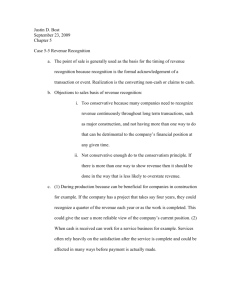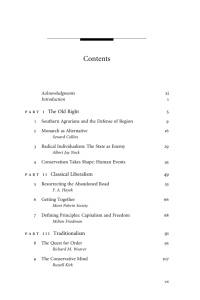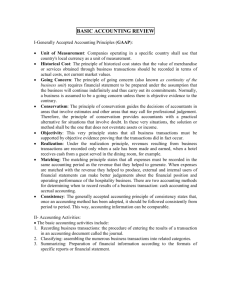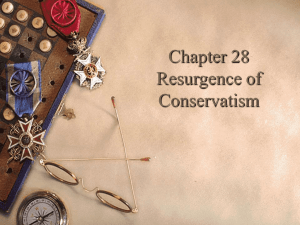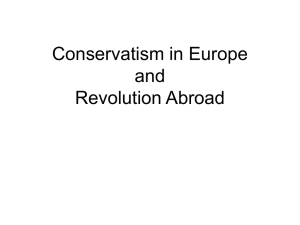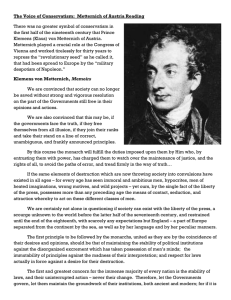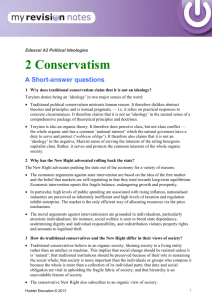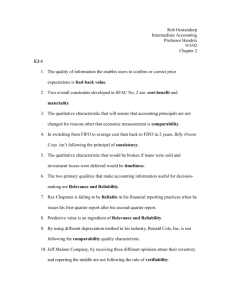History 342 - WesFiles
advertisement
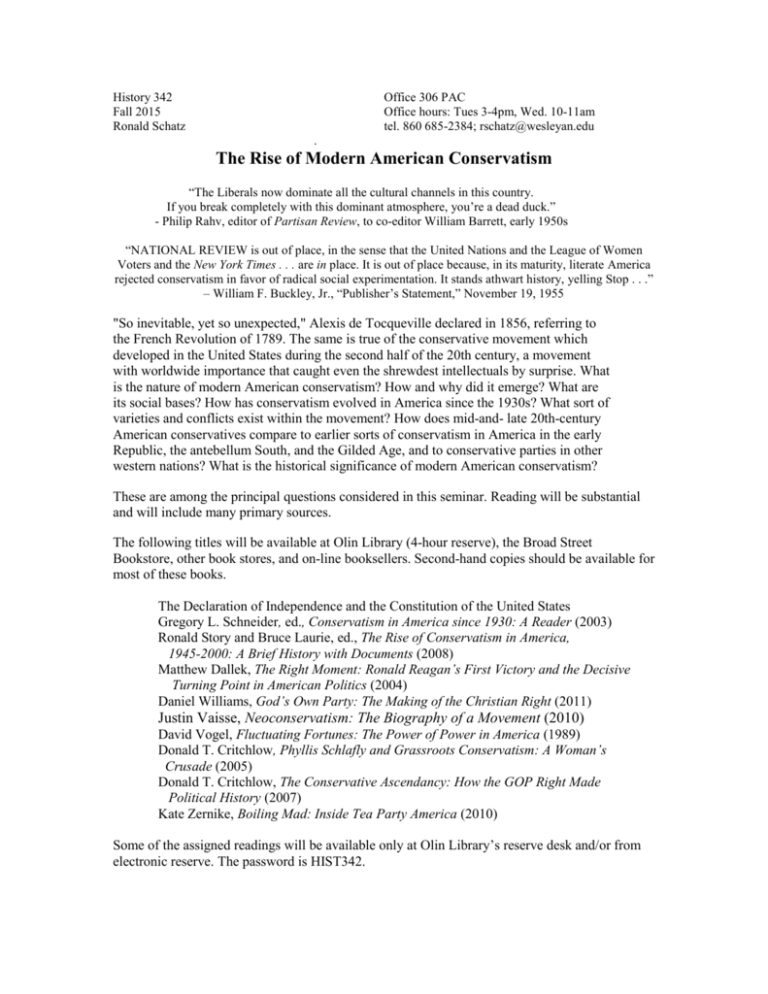
History 342 Fall 2015 Ronald Schatz Office 306 PAC Office hours: Tues 3-4pm, Wed. 10-11am tel. 860 685-2384; rschatz@wesleyan.edu . The Rise of Modern American Conservatism “The Liberals now dominate all the cultural channels in this country. If you break completely with this dominant atmosphere, you’re a dead duck.” - Philip Rahv, editor of Partisan Review, to co-editor William Barrett, early 1950s “NATIONAL REVIEW is out of place, in the sense that the United Nations and the League of Women Voters and the New York Times . . . are in place. It is out of place because, in its maturity, literate America rejected conservatism in favor of radical social experimentation. It stands athwart history, yelling Stop . . .” – William F. Buckley, Jr., “Publisher’s Statement,” November 19, 1955 "So inevitable, yet so unexpected," Alexis de Tocqueville declared in 1856, referring to the French Revolution of 1789. The same is true of the conservative movement which developed in the United States during the second half of the 20th century, a movement with worldwide importance that caught even the shrewdest intellectuals by surprise. What is the nature of modern American conservatism? How and why did it emerge? What are its social bases? How has conservatism evolved in America since the 1930s? What sort of varieties and conflicts exist within the movement? How does mid-and- late 20th-century American conservatives compare to earlier sorts of conservatism in America in the early Republic, the antebellum South, and the Gilded Age, and to conservative parties in other western nations? What is the historical significance of modern American conservatism? These are among the principal questions considered in this seminar. Reading will be substantial and will include many primary sources. The following titles will be available at Olin Library (4-hour reserve), the Broad Street Bookstore, other book stores, and on-line booksellers. Second-hand copies should be available for most of these books. The Declaration of Independence and the Constitution of the United States Gregory L. Schneider, ed., Conservatism in America since 1930: A Reader (2003) Ronald Story and Bruce Laurie, ed., The Rise of Conservatism in America, 1945-2000: A Brief History with Documents (2008) Matthew Dallek, The Right Moment: Ronald Reagan’s First Victory and the Decisive Turning Point in American Politics (2004) Daniel Williams, God’s Own Party: The Making of the Christian Right (2011) Justin Vaisse, Neoconservatism: The Biography of a Movement (2010) David Vogel, Fluctuating Fortunes: The Power of Power in America (1989) Donald T. Critchlow, Phyllis Schlafly and Grassroots Conservatism: A Woman’s Crusade (2005) Donald T. Critchlow, The Conservative Ascendancy: How the GOP Right Made Political History (2007) Kate Zernike, Boiling Mad: Inside Tea Party America (2010) Some of the assigned readings will be available only at Olin Library’s reserve desk and/or from electronic reserve. The password is HIST342. REQUIREMENTS: Conscientious reading, regular attendance, and contributions to the discussion. Be careful with the documents. Reading documents are not like reading textbooks, monographs, or popular fiction. They are more like contracts. They take time to decode. Don’t hesitate to speak up in class. So long as a student has done the reading and respects the opinions of the other students, every contribution is welcome. Writing requirements: Every week submit a list of questions which you would like to discuss in the seminar and/or suggest sentences in the reading that you would like to figure out. Please send these to me via email. Offer a tentative response to at least one of these questions and remarks. These are due no later than Monday, 10 a.m. It’s even better if you can send them on Sunday afternoon. Volunteer once during the semester to present some brief clips from YouTube or other on-line sources relevant to the today’s readings/topics. Submit a proposal for your final essay by email by noon, November 6th. The final essay should be roughly 10-to-12 pages long and address a theme that crosses more than one week’s readings or that involves further investigation into a particular dimension of our subject. The final essay is due by December 19th. I would be glad to meet with students individually to discuss essay topics and can read outlines or drafts as well. If you are a History major and want meet the department’s research requirement through this course, speak to me after class or, if not, another time this week. This is mandatory. Course grade will be based on oral participation, including the on-line clips (30%), the weekly responses (30%), and final essay (40%). OFFICE HOURS, TELEPHONE, E-MAIL ADDRESS: I’ll be happy to talk after class, during my office hours, Tuesday, 3-4 p.m., Wednesday 10-11 a.m., at other times by appointment, and via e-mail. My office is room 306 in the Public Affairs Center. My telephone number is (860) 685-2384. My e-mail address is rschatz@wesleyan.edu. . DISABILITY RESOURCES: Wesleyan University is committed to ensuring that all qualified students with disabilities are afforded an equal opportunity to participate in and benefit from its programs and services. To receive accommodations, a student must have a documented disability as defined by Section 504 of the Rehabilitation Act of 1973 and the ADA Amendments Act of 2008, and provide documentation of the disability. Since accommodations may require early planning and generally are not provided retroactively, please contact Disability Resources as soon as possible. If you believe that you need accommodations for a disability, please contact Dean Patey in Disability Resources, located in North College, Room 021, lpatey@wesleyan.edu or call 860/685-5581 for an appointment to discuss your needs and the process for requesting accommodations. Session I Introduction Introduction and discussion of Ronald Reagan’s speech “A Time to Choose,” which was delivered on television stations across the country in October 1964. Reading: the Declaration of Independence and the U.S. Constitution Session 2 American Conservatives in the Era of Franklin Roosevelt Primary documents: Twelve Southerners, I’ll Take My Stand: The South and the Agrarian Tradition, introduction (1930); excerpts from Albert Jay Nock, Our Enemy, The State (1935); and Jan. 1, 1944 solicitation of subscriptions for Human Events, reprinted in Schneider, pp. 9-15, 29-47. William Henry Chamberlin, The Confessions of an Individualist (1940), ch. 13 (pp. 276-98) John T. Flynn, Country Squire in the White House (1940), chs. 6-9 Robert A. Taft, “Speech at Kenyon College,” The Papers of Robert A. Taft, vol. 3, 1945-1948 (2003), pp. 192-201. Secondary readings: Leo Ribuffo, The Old Christian Right: The Protestant Far Right from the Great Depression to the Cold War (1983), ch. 4 (pp.128-177). Session 3 The Postwar Revolt Primary documents: Mont Pelerin Society Statement of Principles, April 1947; excerpts from F. A. Hayek, The Road to Serfdom (1944); Milton Friedman, Capitalism and Freedom (1962); Richard M. Weaver, Ideas Have Consequences (1948); Russell Kirk, The Conservative Mind (1953); and Frank Meyer, “A Rebel in Search of Tradition,” Freeman (July 1955), reprinted in Conservatism in America, ed., Schneider, pp. 53-129. John T. Flynn, The Road Ahead: America’s Creeping Revolution (1949), chs. 1, 4 & 13 (pp. 7-12, 59-69, 148-159) Strom Thurmond, et al., Platform of the States’ Right Democratic Party, 1948, and William F. Buckley, Jr., “Publisher’s Statement on Founding, National Review,” reprinted in The Rise of Conservatism, ed. Story and Laurie, pp. 38-40, 49-51. Secondary reading: Clarence E. Wunderlin, Robert A. Taft: Ideas, Tradition, and Party in U.S. Foreign Policy (2005), ch. 4 Session 4 Raising the Sword against the Communists Primary documents: Excerpts from Whittaker Chambers, Witness (1952); William F. Buckley, Jr., “Khrushchev at the UN: The Damage We Have Done to Ourselves,” National Review, Sept. 26, 1959; Editors of the National Review, “The Hungary Pledge,” 1956; William F. Buckley, Jr., “National Review: Statement of Intentions,”1955; William F. Buckley, Jr., “National Review: Credenda and Statement of Principles,” all in Schneider, pp. 135-148, 161- 68, 195-205. Joseph R. McCarthy, “Lincoln Day Address,” February 20, 1950, and excerpts from Robert Welch, The Blue Book of the John Birch Society, 1959, reprinted in The Rise of Conservatism, ed. Story and Laurie, pp. 40-43, 54-59. William S. Schlamm, “Across McCarthy’s Grave,” National Review, May 18, 1957, pp. 469-70 – accessible on Olin Library’s website - go to Journals on top of the page, type in title of journal, and follow the links Secondary reading: Critchlow, Phyllis Schlafly, introduction and chs.1-3 (pp. 1-88) Session 5 Popular Agitation during the Late 1950s--Early 1960s Primary documents: Excerpts from Barry Goldwater, The Conscience of a Conservative (1960); William F. Buckley, Jr., “The Young Americans for Freedom,” National Review, 1960; YAF, “The Sharon Statement,” Sept. 1960; excerpts from Phyllis Schlafly, A Choice, Not An Echo,” 1964; Barry M. Goldwater, Acceptance Speech, Republican National Convention, July 16, 1964; reprinted in Schneider, pp. 207-46 “The Question of Robert Welch,” National Review, February 13, 1962 – accessible on Olin Library’s website – go to Journals, type in title of journal, and follow the links Secondary readings: Donald T. Critchlow, Phyllis Schlafly and Grassroots Conservatism , chs. 4-5 (pp. 89-136) Rick Perlstein, “Thunder on the Right: The Roots of Conservative Victory in the 1960s,” The OAH Magazine of History, 20:5 (October 2006), pp. 24-27: http://www.jstor.org.ezproxy.wesleyan.edu/stable/pdf/25162080.pdf Session 6 Political Battles of the 1960s Secondary readings: Dallek, The Right Moment, chs.3- 10 Sam Tannenhaus, “The Buckley Effect,” New York Times Magazine, October 2, 2005, section 6, pp. 68-73, 94, 106, 114, 116; http://proquest.umi.com/pqdweb?did=905866201&sid=1&Fmt=6&clientId=3196&RQT =309&VName=PQD. Critchlow, Phyllis Schlafly and Grassroots Conservatism, chs. 6-8 (pp. 137-211) Michael Kazin, The Populist Persuasion: An American History (1995), ch. 9. Session 7 The Neoconservative Intellectuals Primary documents: James Q. Wilson, “Crime and the Liberal Audience,” Commentary, 51:1 (Jan. 1971); Thomas Sowell, “Affirmative Action: A Worldwide Disaster,” Commentary, Jan. 1989; Jeane Kirkpatrick, “Dictatorships and Double Standards,” Commentary, 68:5 (1979); and Statement by Ambassador Daniel P. Moynihan, U. S. Representative to the United Nations, Nov. 10, 1975, reprinted in The Essential Neoconservative Reader, ed. Mark Gerson (1996). Committee on the Present Danger, “Common Sense and the Common Danger,” reprinted in The Rise of Conservatism, ed. Story and Laurie, pp. 107-110. Secondary reading: Justin Vaisse, Neoconservatism: The Biography of a Movement (2010), introduction, chs. 1-5 (pp. 1-179). Session 8 Evangelical Politics and the Religious Right Primary document: Rev. Jerry Falwell, Listen, America! (1980), chapters to be announced. Secondary reading: Daniel K. Williams, God’s Own Party: The Making of the Christian Right (2010), introduction, chs. 1-8 (pp. 1-186) Session 9 Outcry from the Corporate Executive Boards Primary document: William E. Simon, A Time for Truth (1978), chapters to be announced. Lewis F. Powell, Jr., “Confidential Memorandum: Attack on American Free Enterprise System,” Aug. 23, 1971,” reprinted in The Rise of Conservatism, ed. Story and Laurie, pp. 84-88. Secondary source: Vogel, Fluctuating Fortunes, chs. 1-8 (pp. 3-239) Session 10 Gathering Speed Primary documents: Selected issues of the Eagle Forum - available at reserve room Paul M. Weyrich, “Blue Collar or Blue Blood: The New Right Compared with the Old Right”; Robert J. Hoy, “Lid on a Boiling Pot,” from The New Right Papers, ed. Robert W. Whitaker (1982), pp. 48-62, 84-103. Juan Williams, “Black Conservatives, Center Stage,” Washington Post, Dec. 16, 1980, p. A21 —on line at Olin. Ralph de Toledano, Let Our Cities Burn (1975), chapters 5, 6, 7 and 11. Secondary reading: Donald T. Critchlow, Phyllis Schlafly and Grassroots Conservatism, chs. 9-10 (pp. 212-69) Geoffrey Kabaservice, Rule or Ruin: The Downfall of Moderation and the Destruction of the Republican Party: From Eisenhower to the Tea Party (2012), ch. 11 Session 11 Ronald Reagan & the Conservative Movement Secondary readings: Ted V. McAllister, “Reagan and the Transformation of American Conservatism,” in The Reagan Presidency: Pragmatic Conservatism and Its Legacies, eds. W. Elliot Brownlee and Hugh Davis Graham (2003) Donald T. Critchlow, The Conservative Ascendancy, ch. 7 Vogel, Fluctuating Fortunes, ch. 9 James Mann, The Rebellion of Ronald Reagan: A History of the End of the Cold War (2009), pp. 279-306. Primary documents: President Reagan’s 1981 inaugural address; address before a joint session of the Congress, April 28, 1981; and remarks at the annual meeting of the Association of Evangelicals, March 8, 1983, reprinted in Schneider, pp. 341-61 Session 12 American Conservatism after Reagan Primary sources: Paul A. Gigot, “The Republican Moment,” Wall Street Journal, January 20, 2005, p. A14 Secondary sources: Donald T. Critchlow, The Conservative Ascendancy, ch. 8 Julian E. Zelizer, “How Conservatives Learned to Stop Worrying and Love Presidential Power,” and Michael Kazin, “From Hubris to Despair: George W. Bush and the Conservative Movement,” from The Presidency of George W. Bush: A First Historical Assessment, ed. Julian Zelizer (2010), pp. 15-38, 282-302. Julian E. Zelizer, “Reflections: Rethinking the History of American Conservatism,” Reviews in American History, vol. 38, no. 2 (2010), pp. 367-392: http://muse.jhu.edu/journals/reviews_in_american_history/v038/38.2.zelizer.html Geoffrey Kabaservice, Rule or Ruin: The Downfall of Moderation and the Destruction of the Republican Party: From Eisenhower to the Tea Party (2012), ch. 12 and conclusion. Session 13 Don’t Tread on Me! Readings: Kate Zernike, Boiling Mad, entire Peggy Noonan, “Can the Republican Party Recovery From Iraq?” Wall Street Journal, March 23-24, 2013, p. A13. John B. Judis, “Tea Minus Zero: The Tea Party menace will go not quietly,” The New Republic, May 27, 2010: http://eds.b.ebscohost.com.ezproxy.wesleyan.edu/ehost/pdfviewer/pdfviewer?vid=5&sid=8d2ea0 09-1b0e-433b-b353-2095fec69e4c%4 Peggy Noonan, “The Three Presidential Primaries,” Wall Street Journal, August 15, 2015, p. 11. Norman Ornstein, “The fury and finance fueling Republican insurgents,” Financial Times, 17 August 2015, p. 7. Julius Krein, “Traitor to His Class,” The Weekly Standard, September 7, 2015: http://www.weeklystandard.com/articles/traitor-his-class_1020527.html?page=2, accessed August 31, 2015. Christopher Caldwell, “What’s the Deal with Trump,” The Weekly Standard, September 7, 2015: http://www.weeklystandard.com/articles/what-s-deal-trump_1020773.html?page=2 accessed August 31, 2015. g
